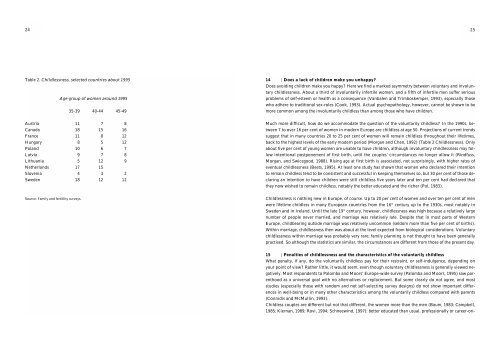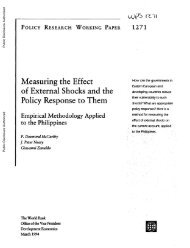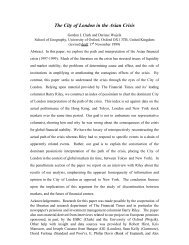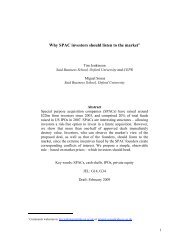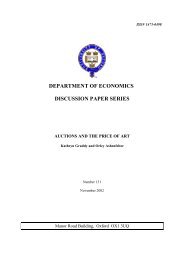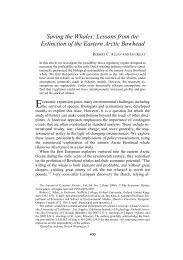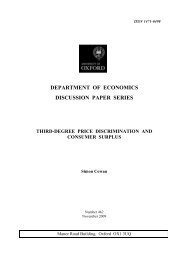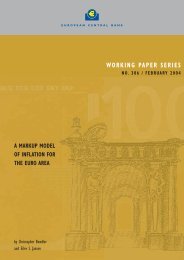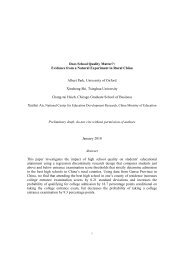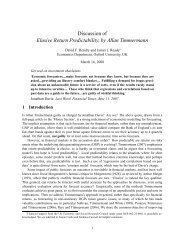Item.pdf - University of Oxford
Item.pdf - University of Oxford
Item.pdf - University of Oxford
Create successful ePaper yourself
Turn your PDF publications into a flip-book with our unique Google optimized e-Paper software.
24<br />
Table 2. Childlessness, selected countries about 1995<br />
Age-group <strong>of</strong> women around 1995<br />
35-39 40-44 45-49<br />
Austria 11 7 8<br />
Canada 18 15 16<br />
France 11 8 12<br />
Hungary 8 5 12<br />
Poland 10 6 7<br />
Latvia 9 7 8<br />
Lithuania 5 12 9<br />
Netherlands 17 15<br />
Slovenia 4 3 2<br />
Sweden 18 12 12<br />
Source: Family and fertitlity surveys.<br />
14 | Does a lack <strong>of</strong> children make you unhappy?<br />
Does avoiding children make you happy? Here we find a marked asymmetry between voluntary and involuntary<br />
childlessness. About a third <strong>of</strong> involuntarily infertile women, and a fifth <strong>of</strong> infertile men suffer serious<br />
problems <strong>of</strong> self-esteem or health as a consequence (Vanbalen and Trimboskemper, 1993), especially those<br />
who adhere to traditional sex-roles (Cook, 1993). Actual psychopathology, however, cannot be shown to be<br />
more common among the involuntarily childless than among those who have children.<br />
Much more difficult, how do we accommodate the question <strong>of</strong> the voluntarily childless? In the 1990s, between<br />
7 to over 16 per cent <strong>of</strong> women in modern Europe are childless at age 50. Projections <strong>of</strong> current trends<br />
suggest that in many countries 20 to 25 per cent <strong>of</strong> women will remain childless throughout their lifetimes,<br />
back to the highest levels <strong>of</strong> the early modern period (Morgan and Chen, 1992) (Table 2 Childlessness). Only<br />
about five per cent <strong>of</strong> young women are unable to have children, although involuntary childlessness may follow<br />
intentional postponement <strong>of</strong> first birth, until the couples’ circumstances no longer allow it (Rindfuss,<br />
Morgan, and Swicegood, 1988). Rising age at first birth is associated, not surprisingly, with higher rates <strong>of</strong><br />
eventual childlessness (Beets, 1995). At least one study has shown that women who declared their intention<br />
to remain childless tend to be consistent and successful in keeping themselves so, but 30 per cent <strong>of</strong> those declaring<br />
an intention to have children were still childless five years later and ten per cent had declared that<br />
they now wished to remain childless, notably the better educated and the richer (Pol, 1983).<br />
Childlessness is nothing new in Europe, <strong>of</strong> course. Up to 20 per cent <strong>of</strong> women and over ten per cent <strong>of</strong> men<br />
were lifetime childless in many European countries from the 16th century up to the 1930s, most notably in<br />
Sweden and in Ireland. Until the late 19th century, however, childlessness was high because a relatively large<br />
number <strong>of</strong> people never married, and marriage was relatively late. Despite that in most parts <strong>of</strong> Western<br />
Europe, childbearing outside marriage was relatively uncommon (seldom more than five per cent <strong>of</strong> births).<br />
Within marriage, childlessness then was about at the level expected from biological considerations. Voluntary<br />
childlessness within marriage was probably very rare; family planning is not thought to have been generally<br />
practised. So although the statistics are similar, the circumstances are different from those <strong>of</strong> the present day.<br />
15 | Penalties <strong>of</strong> childlessness and the characteristics <strong>of</strong> the voluntarily childless<br />
What penalty, if any, do the voluntarily childless pay for their restraint, or self-indulgence, depending on<br />
your point <strong>of</strong> view? Rather little, it would seem, even though voluntary childlessness is generally viewed negatively.<br />
Most respondents to Palomba and Moors’ Europe-wide survey (Palomba and Moors, 1995) saw parenthood<br />
as a universal goal with no alternatives or replacement. But some clearly do not agree, and most<br />
studies (especially those with random and not self-selecting survey designs) do not show important differences<br />
in well-being or in many other characteristics among the voluntarily childless compared with parents<br />
(Connidis and McMullin, 1993).<br />
Childless couples are different but not that different, the women more than the men (Baum, 1983; Campbell,<br />
1985; Kiernan, 1989; Rovi, 1994; Schneewind, 1997): better educated than usual, pr<strong>of</strong>essionally or career-ori-<br />
25


